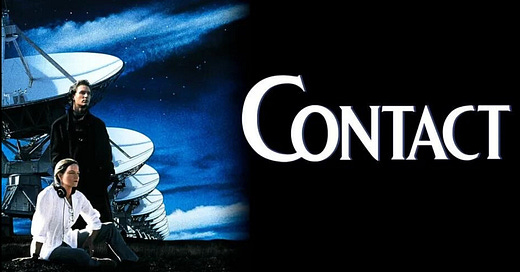"Contact": Outer Space & Inner Space
A film in which life from the stars tells us something about life on Earth.
Contact (1997)
We all know the maxim about polite dinner parties – no religion or politics – and Hollywood has always taken half of it to heart. So rarely does cinema deal directly with questions of faith that when a film dares to take religious experience seriously, it feels daring and fresh. Despite being a quarter-century old, Contact (dir. Robert Zemeckis) still feels remarkably fresh, thanks to the way it puts religion and politics back on the table.
In Contact, Dr Ellie Arroway (played by Jodie Foster) is the stand-in for the kind of highly skeptical scientist for whom test tubes and telescopes are the tools that lead us to what matters most. She is like Richard Dawkins if he weren’t so abrasive; when told the conversion story of Palmer Joss (Matthew McConaughey, playing a “man of the cloth without the cloth”), she gently asks whether his spiritual experience could be accounted for with wishful thinking, but there is no suggestion that she thinks less of him for his belief. Her own incredulity regarding questions of faith goes back to childhood: when her father dies, a priest feeds her the old line about God moving in mysterious ways. Young Ellie disregards the platitudes of the priest, having already decided that help will not come from “out there”, but must come from one’s own efforts.
And yet it is to “out there” that she turns in her professional life, but rather than the voice of God, she seeks signs of intelligent life on other planets. When she finally hears a message from the stars, she takes this as confirmation of her scientific worldview. Others, however, view it through their own lenses – politicians talk about it in terms of “national defence”, and religious fundamentalists see it as an attack on their faith. Demagogues of both the political and religious worlds are present in Contact, but what elevates the film beyond the default atheism of Western liberalism is the inclusion of more thoughtful believers and scientists.
The really interesting conversations occur when Dr Arroway and Father Joss get together. They play out familiar dialogues on faith and science in a way that feels authentic, as if these characters are living, feeling people rather than vehicles for ideas. Contact makes the sensible choice not to go the route of proving or disproving any particular religious belief. Instead, the film champions the “non-overlapping magisteria” espoused by paleontologist Stephen Jay Gould, who claimed that religion and science answered different kinds of question and so can live side by side.
Contact’s most interesting contribution to such conversations comes of focusing on ineffable and noetic religious experiences (to use William James’ terms for them). Palmer Joss sets up the faith aspect of the film early when he describes the experience that led to his conversion, telling Ellie that there are no words to describe it. When Ellie has her own transcendental experience (it wouldn’t be accurate to call it a religious experience), her intellect is quietened, and all she can say is, “There are no words… no words.” What the film offers instead of words are images, which — suffering the passage of twenty-five years and advances in digital effects — are not as awe-inspiring as intended, but the point is still well made. What matters is not the light-show Ellie sees as she flies through the stars, but the expression of rapture on her face.
Contact is a film that takes big swings, and as a result, there are also many strange choices made. A character based on real-life blind astronomer Kent Cullers is named Kent Clark, which was a little too cute for my tastes and funny in the wrong way. During the film’s climax, the adult Ellie’s face – transfixed in wonder on the alien world she is seeing – morphs into the face of her younger self. The point of child-like awe would be better made left unstated, rather than forced to the fore with laughable digital effects.
The scenes that bump the hardest are those with John Hurt’s spaced-obsessed billionaire. First, I couldn’t believe how well the film had inadvertently predicted Jeff Bezos, another shiny-headed billionaire determined to get into space. Second, there was something about Hurt’s performance and the tone of these scenes that made them feel like they were out of a different film. Contact is a remarkably grounded film thanks to its portrayal of contact with aliens in a realistic manner; the scenes with John Hurt feel like a rather silly thriller. While Hurt is always enjoyable on-screen, I also find him to be too much of a “character actor”, playing roles that are intended to strike the viewer with the caricaturistic impression of a single quality.
There are places where the philosophy and theology are a little entry-level, such as a discussion of Occam’s Razor. No one ever gets this right, but Arroway’s definition of the principal as “the simplest explanation tends to be the right one” is particularly egregious. When she then uses Occam’s Razor to insist on needing proof to believe something, Palmer parries by asking for proof that she loved her father, which stumps her. This is a basic failure to understand the burden of proof. The feeling of love she felt is all the proof she needs to believe she loved him. Still, people do make these mistakes in real life conversations, and the fact that a film is (or was, twenty-six years ago) discussing these things at all means that I give these wrinkles a pass. I’m just grateful for cinema that takes such matters seriously.





